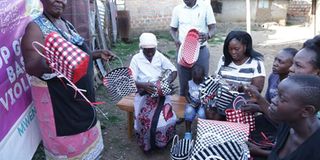Makueni launches safe house for GBV survivors

What you need to know:
- Safe house to shelter male and female survivors of sexual and gender-based violence (SGBV).
- In the last three months, the county has recorded 39 cases of domestic violence.
- Location of safe house not public due to security reasons, but it is within a hospital and near a police station.
- Kiambu and Trans Nzoia counties had in the last financial year, indicated plans to establish safe houses for SGBV survivors.
- State-run safe houses are more sustainable than those funded by development partners.
- Safe house necessity during this Covid-19 period as it offers temporary shelter for survivors unable to seek help elsewhere due to restricted movements.
Makueni County has launched a safe house to shelter male and female survivors of sexual and gender-based violence (SGBV). It becomes the first county to establish the 14-bed facility.
Chief Officer in the county’s Gender Department, Ms Diana Muli said the facility constitutes of female and male wings.
“The female wing has eight beds, while the male wing six. We can accommodate both the adults and children as long as they are accompanied by adults,” she said in a phone interview.
Ms Muli said increasing number of SGBV survivors rendered homeless, prompted them to establish the facility.
“We have a rise in cases of people who are abused and do not have anywhere to go,” she said.
In the last three months, the county has recorded 39 cases of domestic violence, she said.
Survivors, however, can only be accommodated for a maximum of two weeks with those in need of further care staying longer.
Ms Muli, preferred non-disclosure of location of the safe house citing security reasons, but said it is within a hospital and near a police station.
Six staff are attached to the facility including a nurse, counsellor and gender officer, overseeing counselling, treatment and general welfare of the survivors. To be admitted at the facility, however, one has to prove a lack of an alternative place to stay.
Ms Muli said this would deter misuse of the safe house.
KIAMBU, TRANS NZOIA
“We do not want to encourage people to run to the shelter whenever they have minor domestic disagreements,” she said
The safe house was launched in early May, and so far, there has not been any survivor admitted.
Kiambu and Trans Nzoia counties had in the last financial year, indicated plans to establish safe houses for SGBV survivors, an official at National Gender and Equality Commission (NGEC) said.
In Kiambu, however, county executive committee member for education, gender, culture and social services, Ms Mary Kamau said “it is a work in progress.”
Neither is the safe house listed among the accomplished projects under Trans Nzoia’s department of Gender, Youth, Culture, Sports and Tourism, posted on the county government’s website.
It has however, constructed a rescue centre for children.
Campaign Officer at Equality Now, Ms Florence Machio lauded Makueni’s move stating that State-run safe houses are more sustainable than those funded by development partners.
The shelter creates a buffer zone for the survivors to heal and for the police to collect evidence without interference, she noted.
She said, the two-week period for survivors to be at the safe house is adequate enough for them to be counselled and decide on their future.
“While at the shelter, one is counselled and is able to decide on what she or he wants…whether to return to the home or take the matter to court.”
She said the safe house is a necessity during this Covid-19 period as it offers temporary shelter for survivors who are unable to seek help elsewhere due to restricted movements.
During a June 4, webinar, Executive Director of Centre for Rights Education and Awareness Ms Wangechi Wachira urged the 47 counties to set up safe houses to shelter SGBV survivors.
The pandemic, she said, had reaffirmed that homes are not the safest place for women and the need for rescue centres cannot be overlooked.
“We have had so many calls from women saying ‘I cannot continue living in this house, I am facing violence.’ We have to create safe spaces for women where they can find refuge for even a few days,” she said during the Accelerating commitments, investments and action on addressing Violence against Women during and beyond Covid-19 webinar.





